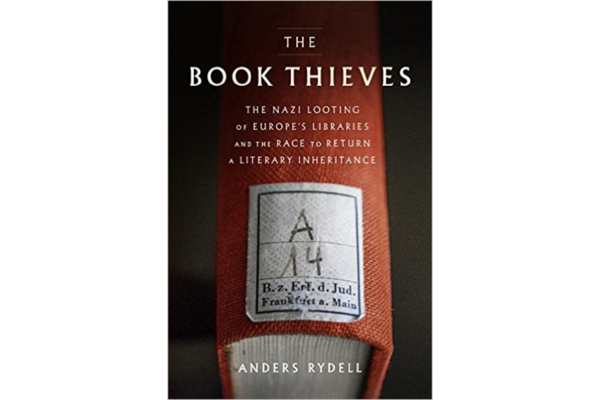Nazi Assault on Books

The pricey paintings and other cultural treasures that were plundered by Nazi Germany have made headlines and been fodder for Hollywood movies. But Hitler’s assault on the written word, the theft and destruction of countless books and religious tracts — estimated well in excess of 100 million — was arguably far worse and has gone largely unreported.
Entire libraries, more than 700 throughout Europe, as well as cherished personal collections disappeared into the maw of the advancing German war machine. The goal of this unprecedented campaign was not cash or cachet, as was the case with looted art, but control of the minds and memories of defeated nations and various people, principally Jews, but also Freemasons, Catholics, and political opponents.
If it had survived, the Third Reich would have been a formidable arbiter of what was considered true, and false for the foreseeable future. The goal was to rewrite history — to concoct fake history, really — albeit one that its creators actually believed was true. An example of harebrained Nazi ideology was that Albert Einstein wasn’t considered a serious scientist, being a promulgator of “Jewish science.” Not unlike today, science was viewed through a political prism.
One of the reasons the systematic and widespread theft of books by Nazis is little known is that literary booty is much harder to trace — never mind to return to the original owners — than paintings by Van Gogh or Vermeer. Individual volumes rarely become cultural rock stars. Another reason is more insidious: After the Nazi defeat many libraries sought to hide the source of purloined portions of their holdings.
Swedish journalist Anders Rydell has undertaken the important and challenging task of chronicling the various efforts that are underway to identify and return stolen books. The millions that were burned or bombed cannot be found, of course: The author estimates that the Nazis destroyed 100 million books during their invasion of the Soviet Union alone.
In his quest, Rydell crisscrosses Europe, visiting libraries whose collections still harbor ill-gotten editions. In his most recent work, "The Book Thieves: The Nazi Looting of Europe’s Libraries and the Race to Return a Literary Inheritance," newly translated to English and revised from the 2015 Swedish publication, Rydell not only documents the myriad historical crimes, he also interviews librarians and researchers, in Germany and elsewhere, who are trying to return the stolen works to their rightful owners — or their descendants.
It wasn’t until this new century that the extent of the Nazi assault on the world’s literary heritage was better, if not fully, understood. Beginning in 1933, public book burnings were held throughout Germany, but it was the war that launched the well-organized campaign of mass thievery.
In the early 2000s, a student working on his thesis was wondering why the owners’ bookplates had been cut out of a large number of volumes in the Berlin Central Library. The more he looked the more he found additional books with suspicious provenance, such as a large collection that once belonging to a museum named for Karl Marx.
This one library, researchers determined, housed as many as 250,000 plundered books, whose origins had been disguised in various ways, initially by the Nazis but later by some librarians. Rydell treks from England to Russian and from Greece to Lithuania tracking down lost books and talking with the people who are finding them.
Along the way he provides ample historical context and puts a human face on this long-running tragedy. The story of Richard Kobrak, in particular, is compelling. A decorated World War I veteran of the German Army, Kobrak and his wife were Christians – but their grandparents had been Jewish and that “stain” was indelible. Their three children escaped to the West, but the couple didn’t; they were gassed at Auschwitz. The author himself delivered the family’s sole remaining possession, a book that the Nazis had confiscated, to the Kobraks’ granddaughter in England.
This often dense account is not easy sledding. The translation frequently doesn’t extend to long German names for places, entities, or currency. The litany of books, libraries, and human beings that were ravished is numbing, while the author concedes repeatedly that the chances of finding rightful owners 75 years after the crime are increasingly small. Of the approximately quarter million purloined editions held by the Berlin Central Library, the author reports that a mere 500 have been returned to date.
Quibbles aside, this is a most valuable book, published here at a time when some are aggressively arguing that facts are in the eye of the beholder. Lydell quotes Michal Busek, a librarian at Prague’s Jewish Museum: “The Nazis knew how important books were to the Jews. Reading makes you a human being. When someone takes it away from you they also steal your thoughts. They wanted to destroy the Jews by robbing them of what was most important to them.”